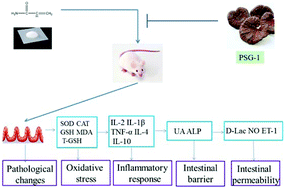This research investigated the protective effects of Ganoderma atrum polysaccharide (PSG-1) on acrylamide (AA) induced intestinal injury in rats. Our results showed that PSG-1 pretreatment effectively reduced the levels of malondialdehyde (MDA), but increased the activity of catalase (CAT), superoxide dismutase (SOD), glutathione (GSH) and the total glutathione (T-GSH), and significantly reduced oxidative stress in AA treated rats. Furthermore, PSG-1 pretreatment down-regulated pro-inflammatory cytokines i.e. interleukin 2 (IL-2), interleukin 1β (IL-1β) and tumor necrosis factor-α (TNF-α) and increased the amounts of anti-inflammatory cytokines i.e. interleukin 4 (IL-4) and interleukin 10 (IL-10), significantly reducing an inflammatory response in the intestines of rats. In AA induced intestinal injury, the tissue uric acid (UA) level and alkaline phosphatase (ALP) activity and the serum level of D-lactic acid (D-lactate), nitric oxide (NO) and endothelin-1 (ET-1) decreased significantly after treatment with PSG-1 and N-acetylcysteine (NAC). Histological observations of the small intestine confirmed the protective effects of different doses of PSG-1. These findings suggested that PSG-1 pretreatment could alleviate AA-induced oxidative stress, reduce inflammatory response, and inhibit AA absorption by protecting the intestinal barrier. Therefore, Ganoderma atrum polysaccharide has the potential to be a dietary supplement ingredient that provides protection against AA-induced gut injury.

